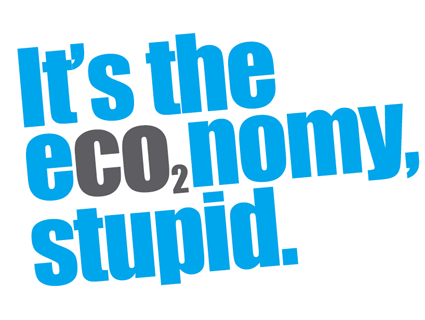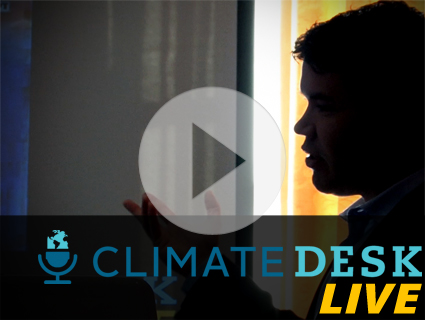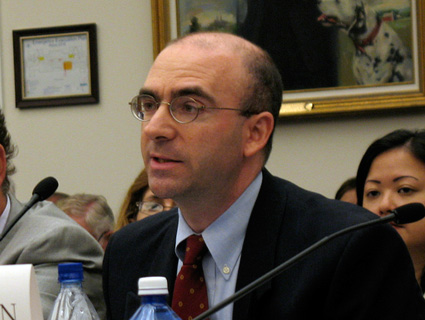
<a href="http://www.flickr.com/photos/wheatfields/2698573338/sizes/o/in/photostream/">Flickr/net_efekt</a>
“I’m disappointed. I was surprised it wasn’t mentioned at all.”
Speaking from his hotel room in Washington, DC, after the third presidential debate last night, Bob Inglis—the former South Carolina Republican representative, and now conservative advocate for climate solutions—said he had truly expected the subject of climate change at last to come up. In this final, foreign-policy focused debate, Inglis thought, a climate-centered exchange between the candidates might have come more naturally than in the US domestic context, where pocketbook issues predominate.
“It was a missed opportunity to recognize action on energy and climate,” said Inglis, “which is clearly related to foreign policy.”
Inglis is just one of a growing number of scientists, environmentalists, and science policy advocates whose jaws have dropped steadily lower over the past month, as the presidential debates have unfolded without any mention of the single leading science-based political and environmental issue. Hundreds of thousands of petitions delivered to PBS’s Jim Lehrer, who moderated the first debate; protests outside the debate site at Lynn University in Boca Raton yesterday; even a “climate silence” campaign featuring images of the candidates with duct tape over their mouths…none of it proved enough to force the issue before nationally-televised debate audiences. While President Obama did mention it in his Democratic National Convention speech in September, climate has now been officially shut out of the 2012 presidential (and vice-presidential) debates.
The causes of this glaring omission are complex, and it’s not as though one group alone is responsible. First, there are the journalists who have moderated the debates, and who have been repeatedly lobbied to talk about climate—to no avail. Their presumed attitudes are perhaps best captured in the words of debate two moderator Candy Crowley, who relegated climate to the status of a kind of groupie issue when she afterwards remarked, “I had that question for all of you climate change people.” She just didn’t have time to get to it, she explained.
But then, neither did the candidates, despite their regular on-air clashes over energy policy. When discussing clean energy last night, for instance, it wouldn’t have been much of a detour for President Obama to mention why we can’t burn fossil fuels forever. Indeed, it’s hard to imagine that his failure to do so is accidental.
In truth, the attitudes of the candidates’ strategists towards the climate issue, and towards science policy in general, may be quite similar to those of moderators Crowley, Lehrer, and Schieffer. “I’ve talked to political operatives, and they think science is a boutique issue, like changing to the metric system or something,” says Shawn Otto, the CEO of the nonprofit group ScienceDebate.org, which focuses on trying to inject discussions of science-based issues into presidential and other campaigns. “They don’t see votes in it.”
ScienceDebate.org did persuade the Obama and Romney campaigns to provide written answers to 14 science policy questions, carefully chosen by leaders of the scientific community to reflect their most pressing concerns. Naturally, one of those questions was focused on climate. And it was easily the most cited and discussed after the candidates provided their written responses—the news hook being that Mitt Romney admitted that human activity “contributes” to global warming, but then went on to cite a “lack of scientific consensus” on the issue.
Yet climate isn’t unique on the ScienceDebate.org list when it comes to its omission in the presidential debates. Almost none of the other topics have been discussed seriously at these events either. That list includes food policy, the heath of the oceans, the availability of freshwater, the state of our natural resources (and especially rare earth elements), fighting off future pandemics, and growing vaccine refusal in the population, with the attendant reemergence of vaccine-preventable diseases.
So what’s really behind this across-the-board science-lite approach?
Last night, Mitt Romney oddly contrasted the state of our Navy today with how it was in 1917, suggesting that we’ve somehow regressed, and find ourselves in a less advanced state than we were nearly a century ago. This led to much mockery when President Obama countered that our armed forces also have fewer bayonets and horses than they did back then. But when it comes to our willingness to focus on science in politics, there may really be a sense in which we have moved backwards—and are now behind where we were in the middle of the last century, when investing in science was seen as central to Cold War competitiveness.
We are, after all, trudging out of a recession—and how do you make an economy grow over the long term? Well, you create jobs, but they need to be high quality ones in innovative sectors—and that means science and technology. After all, according to the Nobel Prize-winning economist Robert Solow, knowledge advances were behind more than half of US economic growth in the first half of the last century.
Last night, the candidates actually both agreed about the importance of funding university-based research—with Romney proceeding to draw a contrast between government funding of basic science on the one hand (which he supports), and loans to clean energy companies on the other. But once again, it’s hard to say that this crucial science policy question was handled with any depth or seriousness. Debate watchers wouldn’t know, for instance, why China poses such an innovation threat—e.g., it is now awarding more natural science and engineering doctoral degrees than we are. (It has also been leading the world in clean energy investments, though in 2011 the US pulled back ahead, at least for the time being. )
Nor was it clear last night to what extent Romney and Obama actually differ on innovation policy. Romney says he supports government research funding, but how would it fare as he attempts to cut taxes and government spending alike? What’s more, Romney’s attempt to draw a line between government funding basic research on the one hand, and the funding of innovative companies, could have been challenged—the relationship is much more complex. Take Google, whose founders Larry Page and Sergey Brin conducted formative research behind the company on grants from the National Science Foundation.
In the end, though, the climate change omission certainly hurts the most. That’s not just because it’s the most high profile science-focused issue today, but also because there are so many ways that it relates to other realms of obvious public concern—from innovation and the clean energy economy to our diplomatic relations with the rest of the world. “To me, these are all issues of public importance,” says Mariette DiChristina, editor in chief of Scientific American magazine. “We just happen to be putting them in a box called ‘science issues'”—which, she suggests, is the fundamental problem.
Inglis adds that in the end, the candidates still don’t seem to understand how talking about fixing the climate benefits them. And maybe that’s the biggest problem of all.
“Most politicians won’t venture out beyond where they think they’ll be supported,” he says. “So we gotta build that support.”
Additional reporting by Tim McDonnell.
















